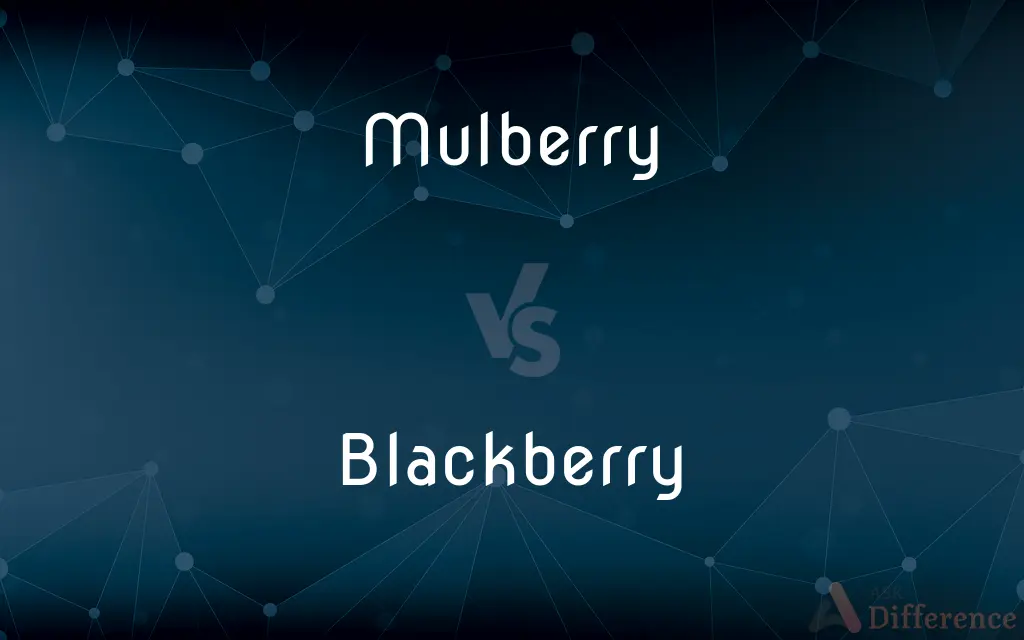Mulberry vs. Blackberry — What's the Difference?
Edited by Tayyaba Rehman — By Fiza Rafique — Updated on October 30, 2023
Mulberries are fruits from the Morus tree with varying colors, while blackberries are aggregate fruits from thorny shrubs. Though both are berries, they come from different plants and have distinct structures.

Difference Between Mulberry and Blackberry
Table of Contents
ADVERTISEMENT
Key Differences
Mulberries originate from the Morus genus of trees, commonly found in warmer climates. These fruits can range in color from red to purple to black, and even white. Blackberries, however, are fruits of the Rubus genus, mostly found in temperate zones and are distinctively black when ripe.
Mulberries have a single, elongated structure and are often mistaken for elongated raspberries. On the other hand, blackberries have an aggregate structure, composed of small drupelets. Each of these drupelets contains a seed, giving blackberries a slightly crunchy texture when consumed.
One of the key differences between mulberries and blackberries is their growth pattern. Mulberries grow on trees, often reaching considerable heights and providing shade. Blackberries grow on low-lying, thorny shrubs or vines, often forming thickets in the wild.
Taste-wise, mulberries are usually sweeter and less tart than blackberries. Mulberries tend to have a mild flavor, while blackberries offer a more robust, tangy taste. Both are packed with vitamins and antioxidants, making them popular choices for health-conscious individuals.
In terms of cultivation, mulberry trees can be more challenging to grow and maintain than blackberry shrubs. Blackberry plants, being hardier, can be grown in various soils and climates, while mulberry trees require more specific conditions and care.
ADVERTISEMENT
Comparison Chart
Origin
Morus genus (trees)
Rubus genus (shrubs/vines)
Structure
Single, elongated fruit
Aggregate of drupelets
Growth
Trees
Thorny shrubs or vines
Taste
Sweeter, milder
Tangy, robust
Climatic Preference
Warmer climates
Temperate zones
Compare with Definitions
Mulberry
A berry from the Morus genus of trees.
The mulberry tree in our backyard yields delicious fruit each summer.
Blackberry
A berry composed of small drupelets, each containing a seed.
Fresh blackberries taste wonderfully tangy.
Mulberry
A deciduous tree producing sweet-tasting fruits.
The silkworm feeds primarily on mulberry leaves.
Blackberry
A member of the Rubus genus producing edible fruits.
The wild blackberry bushes were laden with fruit.
Mulberry
An elongated fruit with colors ranging from red to black.
I picked some white mulberries from the local market.
Blackberry
A dark aggregate fruit from thorny shrubs or vines.
Blackberry pies are a summer favorite.
Mulberry
A berry used in jams, wines, and traditional medicines.
My grandmother made mulberry jam every year.
Blackberry
A fruit often used in jams, desserts, and beverages.
Blackberry smoothies are both delicious and nutritious.
Mulberry
Any of several deciduous trees of the genus Morus, having unisexual flowers in drooping catkins and edible usually purple fruit.
Blackberry
The blackberry is an edible fruit produced by many species in the genus Rubus in the family Rosaceae, hybrids among these species within the subgenus Rubus, and hybrids between the subgenera Rubus and Idaeobatus. The taxonomy of blackberries has historically been confused because of hybridization and apomixis, so that species have often been grouped together and called species aggregates.
Mulberry
The sweet fruit of any of these trees.
Blackberry
Any of various shrubs of the genus Rubus in the rose family, having usually prickly stems, compound leaves, and an aggregate fruit of small drupelets.
Mulberry
A grayish to dark purple. Also called murrey.
Blackberry
The fruit of these plants, usually black, purple, or deep red.
Mulberry
Any of several trees, of the genus Morus, having edible fruits.
Blackberry
A fruit-bearing shrub of the aggregate species Rubus fruticosus and some hybrids.
Mulberry
The fruit of this tree.
Blackberry
The soft fruit borne by this shrub, formed of a black (when ripe) cluster of drupelets.
Mulberry
A dark purple colour tinted with red.
Blackberry
The blackcurrant.
Mulberry
Of a dark purple color tinted with red.
Blackberry
To gather or forage for blackberries.
Mulberry
The berry or fruit of any tree of the genus Morus; also, the tree itself. See Morus.
Blackberry
The fruit of several species of bramble (Rubus); also, the plant itself. Rubus fruticosus is the blackberry of England; Rubus villosus and Rubus Canadensis are the high blackberry and low blackberry of the United States. There are also other kinds.
Mulberry
A dark pure color, like the hue of a black mulberry.
Blackberry
Large sweet black or very dark purple edible aggregate fruit of any of various bushes of the genus Rubus
Mulberry
Any of several trees of the genus Morus having edible fruit that resembles the blackberry
Blackberry
Bramble with sweet edible black or dark purple berries that usually do not separate from the receptacle
Mulberry
Sweet usually dark purple blackberry-like fruit of any of several mulberry trees of the genus Morus
Blackberry
Pick or gather blackberries;
The children went blackberrying
Mulberry
A tree yielding sweet, edible berries.
The mulberry tree provides shade and fruit in our garden.
Blackberry
A thorny shrub bearing juicy, black fruits.
Blackberry thorns can be quite sharp, so be careful while picking them.
Common Curiosities
Why are blackberries sometimes crunchy?
The crunchiness comes from the seeds present in each drupelet of the blackberry.
Which is sweeter: mulberries or blackberries?
Mulberries are generally sweeter and less tart compared to blackberries.
Are blackberry plants invasive?
Blackberries can be invasive in some regions, spreading rapidly and forming dense thickets.
What are the health benefits of blackberries?
Blackberries are rich in vitamins, antioxidants, and fiber, promoting overall health.
Can you eat mulberries raw?
Yes, mulberries can be eaten raw and are sweet in taste.
Can I make wine from mulberries?
Yes, mulberries are often used to make wines, jams, and other products.
Is there a white variety of mulberry?
Yes, mulberries come in various colors, including white, red, and black.
Are mulberries and blackberries the same?
No, mulberries come from trees, while blackberries grow on thorny shrubs or vines.
How often should blackberry bushes be pruned?
Blackberry bushes should be pruned annually for better fruit production and plant health.
Can blackberries be frozen for later use?
Yes, blackberries can be frozen and used later in smoothies, desserts, and other dishes.
How tall can mulberry trees grow?
Mulberry trees can grow anywhere from 30 to 80 feet, depending on the species.
Are mulberries a superfood?
While "superfood" is a marketing term, mulberries are nutritious, offering various health benefits.
Do blackberries have thorns?
Most blackberry varieties have thorns, but there are thornless cultivars available.
Why are mulberry leaves significant in silk production?
Silkworms primarily feed on mulberry leaves, making them vital for silk production.
Is it true that mulberry trees can be messy?
Yes, mulberry trees can drop fruits, which can be messy, especially on sidewalks or driveways.
Share Your Discovery

Previous Comparison
Paralysis vs. Paresis
Next Comparison
Mistruth vs. FalsehoodAuthor Spotlight
Written by
Fiza RafiqueFiza Rafique is a skilled content writer at AskDifference.com, where she meticulously refines and enhances written pieces. Drawing from her vast editorial expertise, Fiza ensures clarity, accuracy, and precision in every article. Passionate about language, she continually seeks to elevate the quality of content for readers worldwide.
Edited by
Tayyaba RehmanTayyaba Rehman is a distinguished writer, currently serving as a primary contributor to askdifference.com. As a researcher in semantics and etymology, Tayyaba's passion for the complexity of languages and their distinctions has found a perfect home on the platform. Tayyaba delves into the intricacies of language, distinguishing between commonly confused words and phrases, thereby providing clarity for readers worldwide.














































